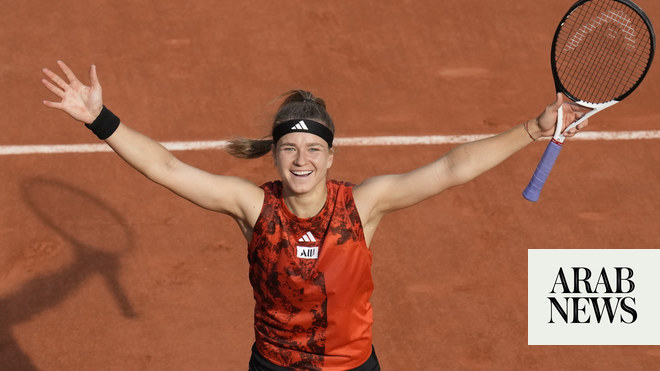
Iga Swiatek’s surname might be as difficult for some to pronounce as her wicked forehand is to read, but the Polish teenager has moved into the final of the 2020 French Open against Sofia Kenin with the familiar ease of reserving a table at the Ritz. She knows she belongs.
While Swiatek’s 6-2, 6-1 win over the Argentinian qualifier Nadia Podoroska was trickier than the score suggests, the 21-year-old American Kenin, who beat Petra Kvitova, 6-4, 7-5, in the second semi-final on Thursday, will know she is in for a fight on Saturday. It as near a certainty as exists in the sport that the 19-year-old Swiatek will challenge for slam titles for years to come – as, probably, will Kenin, who already owns the Australian Open.
Kenin, daughter of Russian emigres but bearing the bloodless robot traits of an American-raised prodigy, and the bubbly Swiatek from small-town Raszyn near Warsaw whose off-court relaxation includes listening to the Stone Roses and AC/DC, could hardly be more different in demeanour, but they share the same burning passion and self-belief.
Mats Wilander, among many, is convinced Swiatek is special. “I genuinely think Iga can be the one,” the seven-slam champion said on Eurosport. “She doesn’t have any weakness, not one.”
“I like her,” said the former British No 1 Sam Smith on ITV. “She’s a little different, wouldn’t be out of place in the 1980s, with her musical tastes.”
Preconceptions have been shredded in Paris from the moment Serena Williams limped out of the tournament in the first week, leaving the way for glorious uncertainty. When Swiatek snapped the 17-win run of the world No 2 Simona Halep in the fourth round for the loss of three games, the lights started flashing. She sealed her irresistible progress to the final by overpowering Podoroska in 70 minutes.
Swiatek and Podoroska were the first unseeded semi-finalists since 1983, when Jo Durie lost to Mima Jausovec – but the gulf between them was apparent from start to finish. The world No 131, who comes from the same city as Lionel Messi, could at least console herself with lasting longer than Halep did. She broke in the fifth game of the second set at the fourth attempt but for long stretches she was not in the fight.
Swiatek’s voice trembles. “It’s hard to believe,” she said. “I think it’s going to hit me after the tournament. Right now I’m just living the dream.”
Only a couple of weeks ago, she said she might leave the Tour to go to university, but says now: “It’s going to be hard to make a decision to go back to studying because I really feel like I can achieve big things. I’m only 19. A lot can change during a few years. Maybe I’m going to be hungry for knowledge. I’m not going to make a decision right now. I’m just going to focus on tennis. If I’m going to be in a few finals of grand slams, it would be impossible to study and play that kind of tennis consistently.”
Three people, probably, will help her decide: Tim Henman’s early-career coach, Nick Brown, who assists her main mentor, Piotr Sierzputowski, and her sports psychologist, Daria Abramowicz, who travels on Tour with her. Already Abramowicz has brought calm to Swiatek’s tennis. “I’m dealing with my nerves pretty good,” she said. “I feel like I’ve been so efficient and so focused for whole matches that I put a lot of pressure on my opponents. I’m not even nervous in second sets because I know it’s going to probably go my way.
“It’s going to be different in the final because I’m going to play a much more experienced player. I will need to be on a different level, the higher level, even though I’m winning easily right now.”
As solid as was Kenin’s win over Kvitova, it was pedestrian by comparison. Kvitova, who has won two Wimbledon’s and reached the final of the 2019 Australian Open, could not dredge up enough of her pedigree to keep Kenin at bay, who held her nerve in a tight finish.
The only Pole before Swiatek to reach the final at Roland Garros was Jadwiga Jedrzejowska in 1939. They called her Jed, for convenience. One day soon, everyone will know how to say Swiatek.
Swiatek (pronounced Shvee-on-tek) roughly translates as a roadside shrine to a locally venerated person – and that probably will resonate with millions of her compatriots if she can go one further than Jed did 81 years ago.












